Areas of Study


"Kindermusik".
Trusted. Proven. Educational. And, fun! Kindermusik International is the world's leading provider of music
and movement programs for young children ages newborn to seven, enjoyed by over 1.5 million families in schools and studios in 70+ countries.

"Voice".
A systematic integration of vocal body awareness and presentation skills applied to vocal performance. Through relaxation, breathing techniques, and body alignment, students learn to identify and balance vocal registers and improve vocal resonance and flexibility. Instruction includes the Alexander technique and emphasis on lyrical interpretation. Improvisational acting methods will be utilized in song performances.

"Guitar".
Study of pop, rock and blues guitar techniques: Song Study, Sight reading. Chord comping, string bending, chromatic harmony in the idiom, tone production, and repertoire. This will be accomplished through analysis of tune melodies and solo transcriptions prepared by the teacher and transcriptions completed by each individual student. Emphasis will be placed on jazz improvisation approaches and their application to rock and blues soloing.

"Piano".
Comping, harmonic continuity. Triads, seventh chords, melody, and accompaniment. Standard song forms, classical Latin pop, rock jazz blues. Practical intermediate keyboard skills for self-accompanying vocalists and singer/songwriters. Focuses on rhythm, voicing, registration, improvisation and overall arrangement. Enhancement of individual performance skills and repertory through study and critiqued performance of musical examples drawn from appropriate contemporary styles.

"Drums".
Musical applications of skills associated with reading in professional performance situations: drum parts, lead sheets, sight-reading, song forms, soloing, playing with brushes, show charts, shifting time-feels, and changes of meter. Extensive use of pre-recorded materials in both large and small ensemble configurations. Application of basic rhythms and techniques to Latin pop, rock jazz blues and avant-garde music.

"Bass".
Latin pop, rock jazz blues. Song study, sight reading bass lines Application of modern and traditional techniques of improvisation for bass. Creating melodic and harmonic concepts through the tools of scales, arpeggios, modal harmony, reharmonization, and rhythmic interpretation. Analysis and application of the principles of harmonic progression in improvisation.
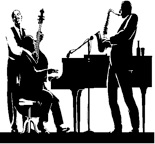
"Jazz Harmony\1-2-3-4".
Basic harmonic theory. Note identification, scale and mode construction, key signatures, interval recognition, chord construction, available tensions. Principles of diatonic chord progressions and analysis. Also secondary and extended dominant relationships. Continued study of melodic construction and motif development. Principles of linear harmonic continuity and guide tone lines. Minor key harmony; introduction to subdominant minor. Blues theory and chord progressions. Melodic rhythm, form, and melody/harmony relationship, continued elaboration of subdominant minor and modal interchange; chord scale theory. Review of melodic construction and melody/harmony relationship; individual note analysis of melodies. Substitute dominant and related II-7 chords; diminished chord patterns; modulation.
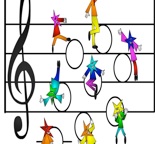
'Solfege 1-2".
Development of sight-singing skills using the traditional movable "do" method. Drills in rhythm, interval, and pitch. Singing exercises in major keys through four sharps and four flats in G and F clefs. Some studies in minor keys. Harmonic studies. Part singing. Contrapuntal and harmonic dictation.

"Ear-training 1-2-3-4".
Development of basic ear training skills through singing and dictation studies. Study of songs, intervals, and exercises in the major scales. Study of basic rhythm patterns. Study of diatonic materials including jazz standards, bass lines, melodic sequence, triads, seventh chords, and common harmonic progressions. Rhythmic study will derive from patterns occurring in classical and contemporary music.
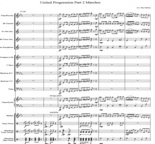
"Arranging 1\2".
A study of the musical concepts of melody, rhythm, harmony, and form as applied to the principles and techniques of writing and arranging for the rhythm section (drums, bass, guitar, keyboards, basic percussion) and a lead-line for a solo instrument, two horns (trumpet plus alto or tenor saxophone), or voice. Focus on the conceptual process of combining individual components to create a musically satisfying arrangement. Exploration of the use and integration of MIDI technology and sequencing as they relate to rhythm section and lead-line writing. Study of various contemporary musical styles and musical concepts that comprise them, including writing from the "bottom up" (groove-driven) and "top down" (working with a melody in a lead instrument or voice). Writing assignments will incorporate combinations of acoustic, electronic, and MIDI instruments.
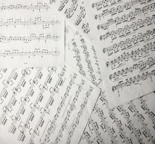
"Classical Theory".
Basic harmonic theory. Note identification, scale and mode construction, key signatures, interval recognition, chord construction, available tensions..
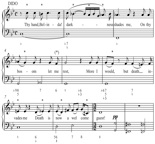
"Classical Harmony".
Diatonic harmony in various musical textures. Melody writing. Harmonization of melodies in various musical textures. Seventh chords, altered chords, modulation.
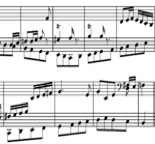
"Counterpoint".
Analysis and writing of three- and four-voice imitative counterpoint based on traditional models. Models include fugue, chorale prelude, and passacaglia or chaconne.
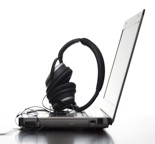
"Computer Based Midi Application's".
The course covers the fundamentals and practical applications of a digital audio system, as well as methods for functioning in an integrated MIDI/Digital Audio Workstation (DAW)/Analog studio environment. Course topics include system setup and interconnections; MIDI interface and synchronization; aspects of digital recording consoles/mixers, such as paged architecture, I/O, word clock, sample rate, and bit depth); and basics of a DAW, such as the elements of hard-disk recording, track and file management, digital audio, and sequencing strategies.
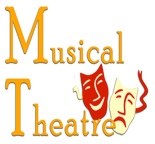
"MUSIC THEATER!!!".
The course covers the theoretical and practical aspects of training for a complete body, vocal and acting preparation and for a live performance. It is a study of the history of music theatre - musicals - operas in the stages of London, America, Asia and Greece. It analyses characters, plots, lyrics and dialogue or spoken language. It combines music with singing and acting. It includes vocal and singing techniques, body awareness as a performer, movement tecniques (warm-up exercises and improvisation, acting methods, theatre games, contact technique, creating sense of partnership, creative skills, attempt to convey sentimentally a vocal or spoken piece) and it involves a preparation for a show and an exposure in front of an audience. Furthermore, there is a conversation on productions, critiques, and a meeting with professional performers. It aims at an individual performance or at a unique open performance which everybody can participate.
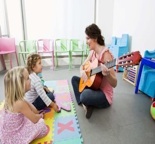
“Music Foundation Classes for young children (Age 3 to 6)!!!”
Our children are the leaders of our future.
Using a small-group approach to music education, this preparatory class for the Young Child provides a pressure-free class, where your child can develop a strong musical foundation by learning the concepts, language, notation, and vocabulary of music and its greatest composers.
This program develops the very young child's potential in music and helps our educators recognize and nurture the child's music making. The program provides a carefully planned sequence of music learning for children and uses the natural human inclination for chanting, singing, and movement as the first steps in understanding melody, rhythm, and improvisation. Through interactive music making with teachers, children discover the body as the primary music instrument. In these classes children experience music by participating in gentle flowing and rhythmic movement activities. The classes are designed around children’s increasing independence and desire to explore and play. Locomotor movement activities allow children to explore their music environment. Teachers will incorporate the children’s spontaneous movement and vocal explorations into classroom songs and chants. Additional manipulatives (co-operband, parachute, and gathering drum) provide opportunities for cooperative group movement and music making. Children explore simple percussion instruments and manipulatives through independent and cooperative music making. Because children at this age have a natural curiosity about symbol systems and are learning to recognize and pre-read letters, numbers, and words, music notation is featured to provide children with a readiness to read notation.
Children experience a playful way of learning theory through games and singing in a fun and friendly atmosphere.
Goals include:
Singing and vocal development
Developing the connection between ear and voice.
Movement.
Focused listening
Exploring and playing musical instruments.
Introducing students to basic music notation (identifying notes, rests, staves, clefs, dynamic and tempo markings)
Familiarizing students with various instruments and diverse musical styles.

Violin (Classical & Jazz style)
The individual violin lessons are highly personalised course tailored to the progress and learning ability of each student. Emphasis is placed on developing good posture and ease of movements at the early stage. Students will then continue to revise and enhance their technique while taking on more challenging repertoire as they progress.Both Traditional and Suzuki methods are offered.
Voice
Guitar
Piano
Violin
Bass
Percussion
Drums
Solfege
Ear-training
Arranging
Jazz Harmony
Classical/Theory
Classical/Harmony
Counterpoint
Computer/Midi/
Applications
Voice Ensemble
Rock Ensemble
Jazz Ensemble
Blues Ensemble
Latin Ensemble
Percussion Ensemble
Music Foundation classes for young children (Age 3 to 6)
Kindermusik
Performance & Audition-Coaching
Personal Counseling
Music Theater
Music School Kyriakides I at 52C Gladstonos, Pentadromos 3041, Limassol Cyprus.
Music School Kyriakides II at 113 Panayioti Tsangari, Pot. Yermasogias, 4042 Limassol Cyprus. Music School Kyriakides III at 19 Protagora, Agios Iwannis, 3060 Limassol Cyprus.
Music School Kyriakides IV at 135A P. Charaki, Agios Athtnasios Panthea, 4105 Limassol Cyprus.
